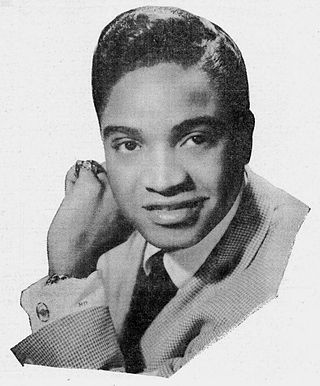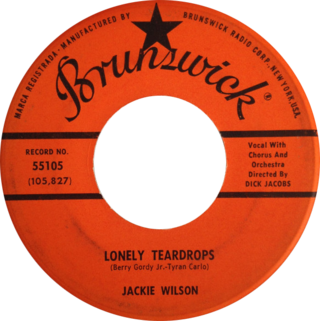
Doo-wop is a subgenre of rhythm and blues music that originated in African-American communities during the 1940s, mainly in the large cities of the United States, including New York, Philadelphia, Pittsburgh, Chicago, Baltimore, Newark, Detroit, Washington, D.C., and Los Angeles. It features vocal group harmony that carries an engaging melodic line to a simple beat with little or no instrumentation. Lyrics are simple, usually about love, sung by a lead vocal over background vocals, and often featuring, in the bridge, a melodramatically heartfelt recitative addressed to the beloved. Harmonic singing of nonsense syllables is a common characteristic of these songs. Gaining popularity in the 1950s, doo-wop was "artistically and commercially viable" until the early 1960s and continued to influence performers in other genres.

Jack Leroy Wilson Jr. was an American singer of the 1950s and 1960s. He was a prominent figure in the transition of rhythm and blues into soul. Nicknamed "Mr. Excitement", he was considered a master showman and one of the most dynamic singers and performers in soul, R&B, and rock and roll history. He was born in Highland Park, an enclave of Detroit.
Chicago soul is a style of soul music that arose during the 1960s in Chicago. Along with Detroit, the home of Motown, and Memphis, with its hard-edged, gritty performers, Chicago and the Chicago soul style helped spur the album-oriented soul revolution of the early 1970s.

Mary Esther Wells was an American singer, who helped to define the emerging sound of Motown in the early 1960s.

Robert Thomas Freeman was an American rock, soul and R&B singer, songwriter and record producer from San Francisco, best known for his two Top Ten hits, the first in 1958 on Josie Records called "Do You Want to Dance" and the second in 1964 for Autumn Records, "C'mon and Swim".

Barbara Jean Acklin was an American soul singer and songwriter, who was most successful in the 1960s and 1970s. Her biggest hit as a singer was "Love Makes a Woman" (1968). As a songwriter, she is best known for co-writing the multi-million-selling "Have You Seen Her" (1971) with Eugene Record, lead singer of the Chi-Lites.

"Do You Want to Dance" is a song written by American singer Bobby Freeman and recorded by him in 1958. It reached number No. 5 on the United States Billboard Top 100 Sides pop chart, No. 2 on the Billboard R&B chart, and No. 1 in Canada. Cliff Richard and the Shadows' version of the song reached No. 2 in the United Kingdom in 1962, despite being a B-side. The Beach Boys notably covered the song in 1965 for their album The Beach Boys Today!; retitled "Do You Wanna Dance?", their version reached No. 12 in the United States. A 1972 cover by Bette Midler with the original title restored reached No. 17.
"Come Go With Me" is a song written by C. E. Quick, an original member of the American doo-wop vocal group the Del-Vikings. The song was originally recorded by The Del-Vikings in 1956 but not released until July 1957 on the Luniverse LP Come Go With The Del Vikings. The final version was released in the second week of January 1957 and was led by Gus Backus. When Joe Averbach, the owner of Fee Bee Records couldn't handle the demand, he signed with Dot Records in late January 1957; the song became a hit, peaking at No. 5 on the US Billboard Top 100 Pop Charts. It also reached No. 2 on the R&B chart.

"Chain Gang" is a song by American singer-songwriter Sam Cooke, released as a single on July 26, 1960.
William Myles Nobles, known as Billy Myles, was an American R&B songwriter and singer active in the 1950s and 1960s. He is best known for writing "Tonight, Tonight" recorded by The Mello-Kings, "(You Were Made for) All My Love" recorded by Jackie Wilson (1960), and "Have You Ever Loved A Woman" recorded by Freddie King (1960), then Eric Clapton (1970).

"Reet Petite (The Sweetest Girl in Town)" (originally subtitled "The Finest Girl You Ever Want to Meet") is a song written by Berry Gordy, Billy Davis, and Gwen Gordy Fuqua, and made popular by Jackie Wilson in his 1957 recording for the Brunswick label. It was his first solo hit after leaving the Dominoes and, over the years, has become one of his biggest international chart successes. It was the UK Christmas number one in 1986, almost three years after Wilson's death.

The Midnighters were an American vocal group from Detroit, Michigan. They were an influential group in the 1950s and early 1960s, with many R&B hit records. They were also notable for launching the career of lead singer Hank Ballard and the worldwide dance craze the twist. Between 1953 and 1962, the Midnighters had several hits on the U.S. pop and R&B charts. Their hits included the million-selling Billboard top 10 pop hits "Finger Poppin' Time", and "Let's Go, Let's Go, Let's Go". The Midnighters also had 13 top 10 R&B hits, including three that reached number 1. Their top 10 R&B hits included "Work with Me, Annie", "It's Love Baby ", "Annie Had a Baby", "The Hoochi Coochi Coo", "Teardrops on Your Letter", "Get It", "The Float" and "Nothing but Good". They received the Rhythm and Blues Foundation's prestigious Pioneer Award in 1992 and were inducted into the Vocal Group Hall of Fame in 1999. The Midnighters are also noted for achieving a music industry milestone in 1960, by becoming the first group in history to place 3 singles on the Billboard Hot 100 at the same time. The group's lead singer, Hank Ballard, was inducted into the Rock and Roll Hall of Fame in 1990. The Midnighters as a group were inducted into the Rock and Roll Hall of Fame on April 14, 2012.

"Who Put the Bomp " is a doo-wop style novelty song from 1961 by the American songwriter Barry Mann, who wrote it with Gerry Goffin. It was originally released as a single on the ABC-Paramount label (10237).

"(Your Love Keeps Lifting Me) Higher and Higher" is an R&B song written by Gary Jackson, Raynard Miner, and Carl Smith. It was recorded by Jackie Wilson for his album Higher and Higher (1967), produced by Carl Davis, and became a Top 10 pop and number one R&B hit.

Nat Tarnopol was an American record producer. He played a vital role in producing and shaping R&B music throughout the 1960s and 1970s as the president of Brunswick Records, a subsidiary label of Decca Records. Responsible for launching the careers of The Chi-Lites, Jackie Wilson, Tyrone Davis, Barbara Acklin and The Young-Holt Unlimited, Tarnopol scored 150 songs on the Billboard charted singles between 1957 and 1981.

"Lonely Teardrops" is a song written by Berry Gordy Jr., Gwen Gordy and Roquel "Billy" Davis, first recorded and released as a single in 1958 by R&B singer Jackie Wilson, on the Brunswick label. The single was commercially successful, reaching the top ten on the Billboard Hot 100, and number-one on the R&B chart. It is ranked as the 57th biggest U.S. hit of 1959.
Ronald David Bright was an American R&B and doo-wop singer of the 1950s, 1960s and 1970s. He was born in New York City.

"I Can't Stay Mad at You" is a song written by Gerry Goffin and Carole King. It was originally recorded by American country artist Skeeter Davis, becoming her second top-ten hit on the Billboard Hot 100 in 1963. "I Can't Stay Mad at You" followed on the popular success of Davis' earlier 1963 crossover hit "The End of the World". The song was one of the first Goffin-King compositions to be recorded by a country music performer.
Earl Lee Nelson, who also performed as Jackie Lee, was an American soul singer and songwriter. He started his career in the doo-wop group the Hollywood Flames in the 1950s before founding the R&B duo Bob & Earl with Bobby Byrd. As Jackie Lee, he's best known for his hit song "The Duck".
Sidney Jackson Wyche was an American songwriter and pianist. Wyche is best known for writing the jazz standard "Alright, Okay, You Win", Elvis Presley's Billboard Hot 100 chart-topper "A Big Hunk o' Love", and the Jackie Wilson hits "A Woman, a Lover, a Friend" and "Talk That Talk".














